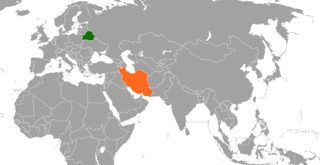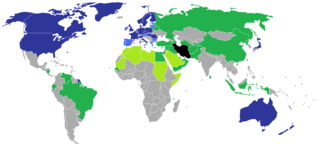The Iranian Green Movement or Green Wave of Iran, refers to a political movement that arose after the June 12, 2009 Iranian presidential election and lasted until early 2010, in which protesters demanded the removal of Mahmoud Ahmadinejad from office. Green was initially used as the symbol of Mir Hossein Mousavi's campaign, but after the election it became the symbol of unity and hope for those asking for annulment of what they regarded as a fraudulent election. Mir Hossein Mousavi and Mehdi Karroubi are recognized as political leaders of the Green Movement. Grand Ayatollah Hossein-Ali Montazeri was also mentioned as spiritual leader of the movement.

The foreign relations of Iran are the economic and diplomatic relationships between the Iranian government and governments of other countries. Geography is a very significant factor in informing Iran's foreign policy. Following the 1979 Iranian Revolution, the newly formed Islamic Republic, under the leadership of Ayatollah Khomeini, dramatically reversed the pro-American foreign policy of the last Shah of Iran Mohammad Reza Pahlavi. Since then the country's policies have oscillated between the two opposing tendencies of revolutionary ardour to eliminate Western and non-Muslim influences while promoting the Islamic revolution abroad, and pragmatism, which would advance economic development and normalization of relations. Iran's bilateral dealings are accordingly sometimes confused and contradictory.

Arab League–Iran relations refer to the political, economic, and cultural ties between the League of Arab States and the Islamic Republic of Iran. The former is a regional organization composed of 22 Arab states in MENA with a combined majority of Sunni Muslims, whereas the latter is a country in Western Asia with a majority of Shia Muslims.

Iranian–Italian relations are the diplomatic relations between the Islamic Republic of Iran and the Italian Republic.

Iran–Tajikistan relations refer to the bilateral relations between Iran and Tajikistan. Since the collapse of the Soviet Union, the two countries have naturally enjoyed a close and strong relationship with the two often being described as "one spirit in two bodies" by the ex-president of Iran Mahmoud Ahmadinejad due to both being Persian-speaking and Iranic countries.

Russia – Zimbabwe relations date back to the mid-1960s, during the Rhodesian Bush War. The Soviet Union supported Joshua Nkomo's Zimbabwe African People's Union, and supplied them with arms; Robert Mugabe's attempts to gain Soviet support for his Zimbabwe African National Union were rebuffed, leading him to enter into relations with Soviet rival Beijing. Throughout the 1980s Zimbabwean relations with the USSR were notoriously cold. Mugabe "stonewalled" the Soviets "for ten months" rather than establish relations with them while he was establishing relations with other countries including the United Kingdom and the United States. The agreement the Soviets were forced to agree to demanded they meet strict criteria about how they could operate in Zimbabwe, while no other country had to agree to similar concessions before establishing relations. The agreement was described as "embarrassing and humiliating for the Soviets since it singles them out." Mugabe shunned Soviet help and allowed British military bases to be established in Zimbabwe against protests from Moscow. Mugabe also accepted the help of British military advisers and declined the same offers from the Soviet Union. Several American-made movies were aired in Zimbabwean movie theaters in the 1980s that the Soviets believed constituted "anti-Soviet propaganda," including the movies Invasion U.S.A., Red Dawn, Firefox, Rocky IV, Rambo: First Blood Part II, Water, The Living Daylights, The Whistle Blower, and Rambo III. The Soviet embassy officially protested, however, they were allegedly told by Mugabe "to complain to your ZIPRA friends." However, since the 2000s Robert Mugabe had strengthened his relations with both Beijing and Moscow as a result of intense western pressure on him. Zimbabwe was one of the few countries that voted with Russia on United Nations General Assembly Resolution 68/262 about the annexation of Crimea. Russia maintains strong economic and political ties with Zimbabwe. Russia still maintains an embassy in Harare. Both Russia and China still maintain strong economic and political ties with Zimbabwe and both countries had vetoed the UN resolution imposing UN sanctions on Zimbabwe which was proposed by both the US and the UK on July 12, 2008.

Canada and Iran have had no formal diplomatic relations since 2012. In the absence of diplomatic representation, Italy acts as the protecting power for Canada in Iran and Switzerland acts as Iran's protecting power in Canada.

The Byelorussian Soviet Socialist Republic recognized de facto the Islamic Republic of Iran in February 1979, and Belarus and Iran established de jure diplomatic relations in 1992. Belarus has an embassy in Tehran. Iran has an embassy in Minsk.

Reactions to the 2009 Iranian presidential election varied across the world. Most Western countries expressed concern, while most countries in Latin America, Asia, and Africa that expressed any opinion congratulated Mahmoud Ahmadinejad for his victory. The UN and EU also expressed concern about the aftermath.

The foreign policy of the Mahmoud Ahmadinejad administration was the policy initiatives towards other states by the former President of Iran, as different from past and also future of the Iranian foreign policy. Ahmadinejad's tenure as president came at a time of greater conflict, rhetorical or physical, than his predecessors. In following this there were various measures, external or internal, that led to his policy changes. This was primarily a division between relations with states of the Western world and the rest of the world.

Brazil–Iran relations are the bilateral relations between the Federative Republic of Brazil and the Islamic Republic of Iran. Relations are characterized by economic and diplomatic cooperation and are quite friendly. Iran has a productive trade balance with Brazil. The two governments signed a document to bolster cooperation during the G-15 Summit in Tehran in 2010. However, since the election of former Brazilian president, Dilma Rousseff, relations between the two countries recently have deteriorated greatly, following Rousseff shifting Brazil away from Iran due to Iran's violation of human and civil rights. Mahmoud Ahmadinejad's media adviser, Ali Akbar Javanfekr, was quoted as stating that Rousseff had "destroyed years of good relations" between them. He denied making such a statement.

Ghana–Iran relations refers to the current and historical relationship between Ghana and Iran. Ghana has an embassy in Tehran, and Iran has an embassy in Accra.

Iran–Ukraine relations are the bilateral relations between Iran and Ukraine. Iran has an embassy in Kyiv and Ukraine has an embassy in Tehran. Prior to 2020, the relationship between the Islamic Republic of Iran and Ukraine was friendly but has since sharply deteriorated due to Iran supplying its Shahed military drones to Russia during the 2022 Russian invasion of Ukraine as well as the downing of Ukraine International Airlines Flight 752 by Iran's Islamic Revolutionary Guard Corps in 2020.
The Taliban has ruled Afghanistan as the Islamic Emirate of Afghanistan since taking control by force in 2021, overthrowing the internationally recognized Islamic Republic of Afghanistan. The takeover was widely criticized by the international community, and no countries have extended diplomatic recognition to the new regime, despite nominally maintaining relations with Afghanistan. The Taliban has campaigned for international recognition since the takeover. Several countries have vowed never to recognize the Islamic Emirate, and others have said they will do so only if human rights in the country are respected. Some countries have accredited Taliban diplomats at the chargé d'affaires level despite not recognizing the Islamic Emirate. In September 2023, China became the first country to formally name a new ambassador to the country since the takeover, even though China still does not formally recognize the Taliban.
Burundi–Russia relations are the bilateral relations between Burundi and Russia. Both countries established diplomatic relations on 1 October 1962 Russia has an embassy in Bujumbura. Burundi has an embassy in Moscow. Relations improved when Burundian relations with the west deteriorated. In recent years, Russia and Burundi consistently remains similar visions and collaboration in international arena, including UN framework. Russia considers Burundi one of its trusted allies on the African continent.
Belarus–Syria relations refer to the relationship between Belarus and the Syrian Arab Republic. Both countries established diplomatic relations in 1992. Belarus has an embassy in Damascus and Syria has an embassy in Minsk.
Iran and Myanmar established diplomatic relations on 8 August 1968. Both countries are members of the Non-Aligned Movement. Iran has a non-resident ambassador located in Bangkok.
Burundi and Iran established diplomatic relations on 31 March 1985. Iran has a non resident ambassador in Kampala.
Eritrea and Iran established diplomatic relations on 31 May 2007
Brunei and Iran established diplomatic relations on 1 May 1990. Relations have been generally strong and have been similar to Iran's relations with Indonesia. Both countries are members of the Organisation of Islamic Cooperation.












